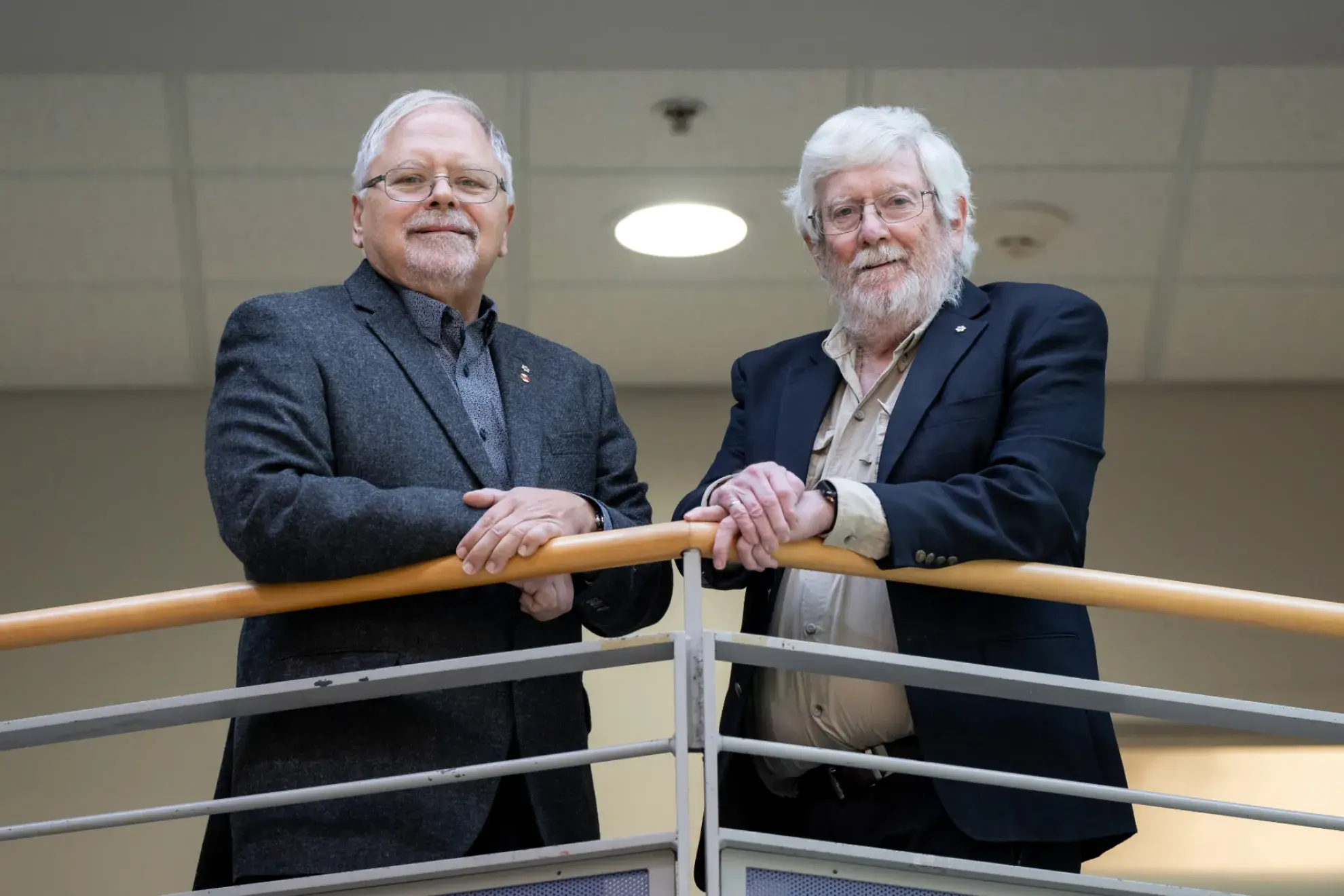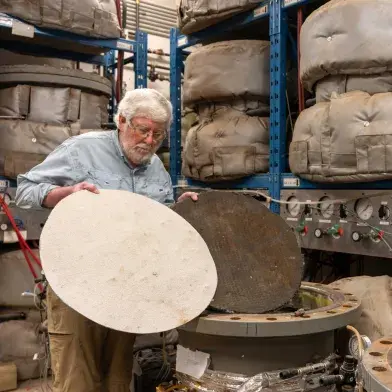
Together, the careers of John Smol and Kerry Rowe represent a remarkable eight decades of research advancing knowledge, fueling innovation, and playing a pivotal role in shaping future generations of STEM researchers.
The Natural Sciences and Engineering Research Council of Canada (NSERC) is recognizing two Queen’s University researchers for their career and lifetime achievements in environmental science. Kerry Rowe and John Smol have each earned major NSERC awards, acknowledging the national and global impact of their work and underscoring the university’s leadership in environmental research.
Rowe has received the prestigious Gerhard Herzberg Canada Gold Medal for Science and Engineering, awarded annually to a Canadian whose research achievements have demonstrated persistent excellence and influence in the natural sciences or engineering. The Herzberg Medal is widely considered to be Canada’s highest honour for research in these fields.
Smol has been awarded the Donna Strickland Prize for Societal Impact of Natural Sciences and Engineering Research. The annual award is given to a team or individual whose research has significantly benefitted society, the environment, or the economy.
“These awards showcase the high calibre of environmental science research at Queen’s and its potential to create meaningful change," says Patrick Deane, Principal and Vice-Chancellor. "Drs. Rowe and Smol are addressing some of the world’s most critical challenges, and these recognitions emphasize the broad impact of their work, here and around the world.”

Kerry Rowe is an internationally renowned expert in geoenvironmental engineering including landfill design and contaminant migration.

John Smol is considered the top researcher in his field and has played a key role in shaping evidence-based environmental conservation policies.
With these awards, Rowe and Smol add to their long lists of accomplishments, including as Officers of the Order of Canada, members of the Royal Society of Canada and the Royal Society (London), and recipients of the Killam Prize. In 2004, Smol became the youngest Herzberg Gold Medalist, while in 2022, Rowe was the inaugural winner of the Strickland Prize. Together, the careers of Rowe and Smol represent a remarkable eight decades of research. Their work advances knowledge, fuels innovation, and plays a pivotal role in shaping future generations of STEM researchers.
Gerhard Herzberg Canada Gold Medal: Global impact
Kerry Rowe is an internationally renowned expert in geoenvironmental engineering including landfill design and contaminant migration. A Barrington Batchelor Distinguished University Professor in the Department of Civil Engineering, he is credited with pioneering approaches that have transformed understanding of how different components, like leachate collection layers, geomembranes, and clay liners, work together to prevent ground and surface water contamination. Notably, Rowe is also responsible for creating the only scientifically based technique for predicting the lifetime of landfill liner systems. He has advised on over 180 projects worldwide and shaped regulatory standards in Canada, Australia, South Africa, and beyond.
“Receiving the Herzberg is an incredible honour and a testament to the significance of applied research in addressing global challenges. The ability to influence environmental policy and improve infrastructure systems has far-reaching benefits, and this award highlights the importance of continuing to push boundaries in science and engineering.”
– Kerry Rowe, 2024 NSERC Gerhard Herzberg Canada Gold Medal
The Herzberg Medal includes a grant of up to $1 million over five years, supporting university research initiatives or funding scholarships and research chairs in Rowe’s name.
Rowe will join an esteemed group of past recipients, including Queen’s Nobel Laureate (2015) Art McDonald who won the Herzberg Medal in 2003, and artificial intelligence experts Yoshua Bengio (2023) and Geoffrey Hinton (2010), who was recently awarded the 2024 Nobel Prize in Physics.
Learn more about Kerry Rowe’s research.
Donna Strickland Prize: Societal impact
John Smol's work at the Queen’s Paleoecological Environmental Assessment and Research Laboratory (PEARL) has led to the development of many approaches for evaluating long-term ecological changes and climate change. Using lake sediment cores – long tubes of mud collected from lake bottoms, sliced into thin layers, and dated – he pioneered novel methods for reconstructing historical characteristics of lake ecosystems to better understand how they will respond to future changes and address many water quality issues. Smol is considered the top researcher in his field and has played a key role in shaping evidence-based environmental conservation policies – including key contributions to the acid rain debates in the late-1980s, and more recently on environmental issues for lakes surrounding Alberta’s oil sands, as well as identifying the effects of climate change in the Arctic and elsewhere.

“I’ve had the privilege of working with incredible students and colleagues whose passion has driven our discoveries in understanding biological processes. The support from this prize will allow us to further our research and expand opportunities for the next generation of scientists.”
– Dr. John Smol, 2024 NSERC Donna Strickland Prize
Smol has received over 100 awards and honours for his work, many of which highlight his teaching, mentoring, and outreach contributions. The Donna Strickland Prize comes with a grant of $250,000 over three years, enabling further research and knowledge mobilization.
Learn more about John Smol's research.
“The NSERC awards recognize the dedication and excellence of Drs. Rowe and Smol and the Queen’s research community,” says Nancy Ross, Vice-Principal (Research). “We are proud to support their work, which inspires a better, more sustainable future for all, and congratulate them on these incredible honours!”
Kerry Rowe and John Smol were recognized at a ceremony in Ottawa. For more information on the prizes, visit the NSERC website.
This article appeared originally in the Queen's Gazette.